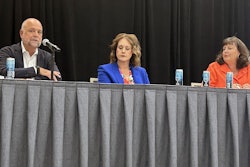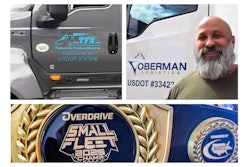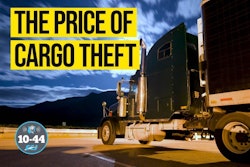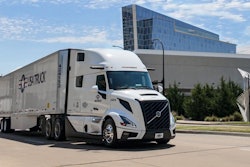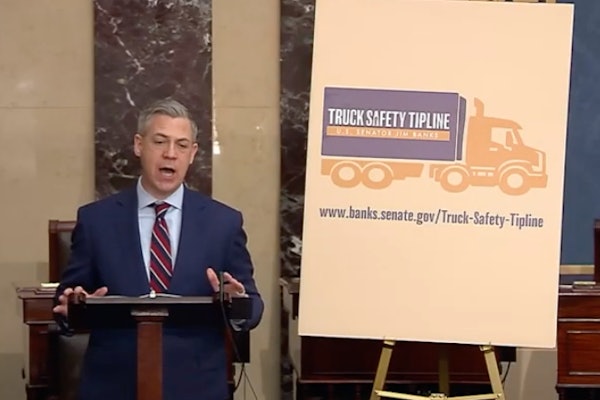
The economy remains transportation's biggest woe, according to the American Transportation Research Institute's (ATRI) 21st annual Top Industry Issues report, released Sunday at the American Trucking Associations' 2025 Management Conference & Exhibition in San Diego.
The economy has been the top concern of motor carriers since 2023.
Among truck driver respondents, Driver Compensation, Truck Parking, and English Language Proficiency were the top three concerns, while motor carriers ranked the Economy, Lawsuit Abuse Reform, and Insurance Cost and Availability as their top three. The results of both groups – more than 4,200 respondents – were weighted and blended to develop the overall ranking.
Lawsuit Abuse Reform and Insurance Cost and Availability each climbed one spot overall to Nos. 2 and 3, respectively. A lack of Truck Parking dropped two spots this year to No. 4, and Driver Compensation held on to the No. 5 spot.
Four new issues landed in this year’s Top 10: English Language Proficiency for Drivers, Diesel Emissions Regulations, Driver Training Standards, and Artificial Intelligence in Trucking.
After dropping to the ninth overall spot last year, Driver Shortage fell out of the top 10 for the first time in the survey’s 21-year history. It may be gone from the Top 10, but it is not forgotten. Driver Shortage settled at No. 12. Motor carriers still rank the need to find and retain qualified drivers as their Nos. 5 and 6 concerns, respectively.
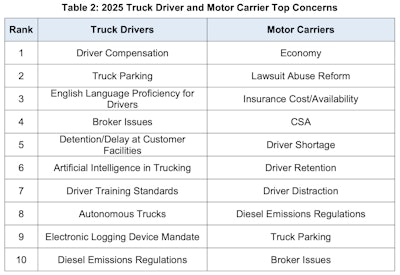
Diesel Emissions Regulations, which have been batted around for much of this year ahead of a 2027 compliance deadline, appeared on the list for the first time at No. 8, supplanting previous concerns related to zero-emission vehicles, which had ranked in the Top 10 the previous two years. The Trump administration’s move to revoke California’s electric vehicle mandates earlier this year dropped Battery Electric Vehicles from No. 6 in last year’s survey to No. 23 this year.
10. Artificial Intelligence in Trucking
The almost infinite data generated by freight systems makes the labor-constrained trucking industry a logical testbed for AI but there is concern that greater reliance on AI could lead to the elimination of jobs, said Rebecca Brewster ATRI president and COO. Additionally, AI-enabled fraud and theft creates additional concern among industry stakeholders.
Andy Owens, ATRI Research Advisory Committee chairman and CEO of 110-truck A&M Transport, said his company had two total loss accidents last year and is looking to implement AI to eliminate driver distractions.
Adam Kahn, chief marketing officer at Netradyne, added it's important to involve drivers in the decision to implement AI.
9. Driver Training Standards
FMCSA’s 2022 Entry-Level Driver Training (ELDT) rule required that new entrant truck drivers complete a structured program of theory and behind-the-wheel instruction before taking the Commercial Driver’s License skills test. It also provided for an online Training Provider Registry where CDL training programs could self-certify that they met the federal training requirements.
Emily Plummer, professional truck driver for Prime (CCJ Top 250, No. 15) and an America's Road Team Captain, said carriers should focus on training by sending a new driver with a veteran driver mentor for real-world experience.
"You can't learn just driving around in circles in a parking lot," she added.
The Owner-Operator Independent Drivers Association on Oct. 20 sent a letter to leaders in Congress that urges stronger standards for driver training, licensing and qualifications. Among OOIDA’s requests to Congress was for lawmakers to pass Rep. David Rouzer’s (R-North Carolina) bill that would codify the DOT’s interim final rule related to non-domiciled CDL issuance.
8. Diesel Emissions Regulations
NOx rule is scheduled to take effect with model year 2027 trucks and is expected to increase the cost of new diesel trucks. This comes on the heels of post-COVID-related impacts that have added more than 20% to the average price of new Class 8 trucks. The timing and impacts of this regulation on new truck purchases, particularly during a freight recession, make this a top-ranked issue.
Owens noted 60% of his fleet's miles are in California and state-level regulations at odds with federal rules have made equipment acquisition planning difficult. He was also a user of renewable diesel in Oregon, but when tax credits for that fuel expired, he said it became cost prohibitive.
The American Trucking Associations, National Tank Truck Carriers, Truckload Carriers Association, and 49 state trucking associations in August penned a letter to the Environmental Protection Agency calling for a delay in the implementation of EPA's heavy-duty NOx rule until 2031.
7. English Language Proficiency for Drivers
President Donald Trump in April required that the Secretary of Transportation – through FMCSA – issue new guidance outlining revised inspection procedures necessary to ensure compliance with the requirements that truck drivers must “read and speak the English language sufficiently to converse with the general public, to understand highway traffic signs and signals in the English language, to respond to official inquiries, and to make entries on reports and records.”
English Language Proficiency for Drivers was added to the list of issues in the 2025 survey due to the number of write-in responses to the 2024 survey that indicated that drivers operating without being proficient in the English language was a top industry concern, and it landed at No. 7 on the list.
"It's important that you know what the road signs say," Plummer said. "Just to keep the next driver beside you safe."
Owens noted English proficiency compliance should go hand-in-hand with Driver Training Standards.
6. Compliance Safety Accountability (CSA)
FMCSA’s safety measurement system jumped one spot this year. In November 2024, FMCSA announced a number of changes that it intended to make to CSA in response to industry concerns, including reorganizing several BASICS (which will now be called compliance categories), simplifying the severity weights, and placing a greater focus on more recent violations. However, FMCSA has not announced when those changes will be implemented.
"It's a disgrace that it's even on the Top 10. This thing should have gotten fixed 10 years ago," Owens said. "We spend way too much time trying to sort it out."
5. Driver Compensation
ATRI’s Operational Costs of Trucking research found that driver wages – the primary contributor to cost increases in the three years following the COVID-19 pandemic – rose by just 2.4%, half a percentage point less than inflation.
"Drivers right now, we're worried," Plummer said. "We don't know how long we're going to be in this recession. What we're seeing right now is a lot of drivers are having to take money from their nest egg and use it."
Among motor carriers responding to ATRI's query, 8.1% selected Driver Compensation as one of their top concerns, reflecting the challenge of continuing to increase driver pay against a backdrop of lower freight volumes and declining rates.
Owens noted the freight recession has made raising pay difficult, adding that the costs of many benefits that employers pay for have also gone up.
4. Truck Parking
A new study commissioned by the Truck Parking Club company and conducted by transportation economist Noel Perry quantifies the truck parking shortage, finding a cost of $100 billion annually incurred by truckers specifically and, more broadly, the U.S. economy itself.
Truck drivers need 2.4 million parking spots suitable for rest across the U.S. highway system, the study found, yet there are only 697,000 spots available to them.
Among truck drivers taking part in ATRI's survey, parking was the second most critical industry issue, but there has been some positive news this year, ATRI pointed out. Ohio and Pennsylvania both recently announced the expansion of truck parking capacity, with 1,400 spots to be added in Ohio and 1,200 in Pennsylvania, Brewster noted, adding 40% of states have applied for grants to expand truck parking.
Plummer noted truck parking isn't so much an issue as safe truck parking, adding she has recently started to see an increase in available safe parking.
"I can go out there and put my truck anywhere, but am I safe?" she asked. "The answer is no."
Owens said his fleet has seen an uptick in cargo theft attempts among trucks parked in non-traditional places.
3. Insurance Cost/Availability
This climb in ranking is not surprising as ATRI’s Operational Costs of Trucking research documented insurance premium cost increases of 36% over the past eight years, Brewster noted. While there are multiple factors driving these increases, ATRI said the need for lawsuit abuse reform is inextricably linked to the losses incurred by motor carriers and their insurers as a result of excessive litigation.
Owens noted rising insurance costs aren't limited to trucks and trailers. Too much attention is given to liability and collision costs, but rising health insurance benefits are also problematic.
2. Lawsuit Abuse Reform
Lawsuit Abuse Reform in 2025 reached its highest ranking in the 21-year history of the Top Industry Issues Survey.
While the industry has seen some successful legislation at the state-level to address lawsuit abuse, ATRI noted the tactics employed by the plaintiff bar to target the industry also continue to expand, from third-party litigation funding to underwrite plaintiff cases to staged accidents designed to extort large settlements from trucking and insurance companies. The latter is the target of new federal legislation introduced in April 2025. The Staged Accident Fraud Prevention Act would make it a federal crime to engineer a crash with a commercial motor vehicle.
Kahn noted he closely follows this issue and has seen the battle between litigators and truck crash data. Every time trucking makes headway in lawsuits, like with the implementation of telematics data and video-based platforms, the goalposts move.
"Like it or not, the insurance carriers are for-profit," he said. "They don't want to pay."
1. Economy
The impacts of rising operational costs and a lingering freight recession are pushing more carriers out of the industry.
Operating costs minus fuel documented in ATRI’s annual Operational Costs of Trucking research were $1.779 per mile, the highest in the 17-year history of the research. Coming on the heels of two years of reduced freight demand and declining freight rates, the addition of increased – and frequently changing – tariffs this year has introduced additional strain and uncertainty for the freight industry.
Owens noted the economy influences other things on the list, like driver pay.
Kahn agreed, adding it has limited fleets' ability to invest in technologies, forcing motor carriers to choose where to put their money.
Be on the lookout
ATRI annually dubs overall concerns 11 through 13 its Emerging Issues. For 2025, those are Driver Distraction, Driver Shortage and Broker Issues.
Driver Distraction
Driver Distraction first appeared in the Top 10 in 2014, ranking 10th overall and then dropped off the Top 10 list until 2023, when it ranked No. 7. Last year Driver Distraction was the 10th overall concern. The National Highway Traffic Safety Administration (NHTSA) reports that 3,308 people were killed in traffic crashes in 2022 that were found to be distraction-affected crashes, and 368 of those individuals died in crashes involving at least one driver who was engaged in cell-phone-related activities.
Broker Issues
Broker Issues first appeared in the Top Industry Issues Survey in 2023, landing at No. 8 among truck drivers. Last year it climbed to No. 6 among drivers and this year is No. 4. Reaching No. 13 overall this year, Broker Issues suggests that both drivers and motor carriers are experiencing challenges with broker fraud, broker liability litigation and double-brokering. ATRI’s recent research on cargo theft identified double-brokering as a primary tool used by thieves in strategic theft.


